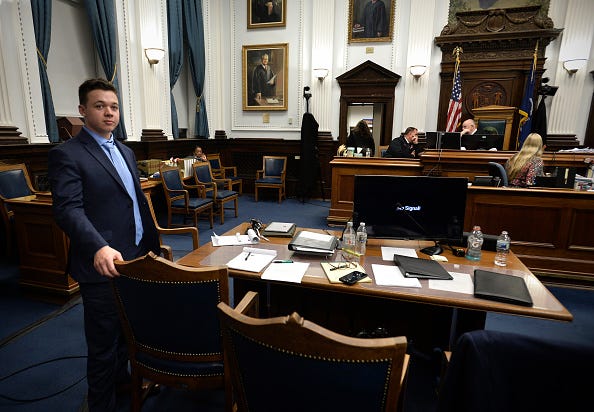The Rittenhouse Trial and the Looming Wild West
November 15, 2021
Dear Subscribers,
Whether you have followed the trial of Kyle Rittenhouse, which is on the verge of being submitted to the jury, in great detail or only heard about it from passing reports, you may have gotten the sense that the parties in the courtroom are engaged in a monumental demonstration of the American legal system’s habit of missing the point.
The trial turned into something like a high-stakes version of video assisted review, with both prosecution and defense attorneys leading the witnesses and the jury through the copious footage and photography that emerged from that tragic, deadly night in Kenosha frame by frame, again and again. Each side has embraced the notion that the most significant truths—or at least the ones on which the defendant’s claims of self-defense will stand or fall—lie in the most fine-grained, split-second details of footfalls and muzzle positions.
Of course, I don’t question the legal logic that has led the courtroom proceedings to that highly particularized inquiry—particularly for the defense, which has nothing else to argue. Nevertheless, I’m grieving for the prospect of justice emerging from it. (For purposes of this discussion, I’m leaving aside entirely the eccentric behavior of the judge, though it is surely another source of regret for people hoping the outcome might be accepted by all.)
What’s undisputed in the case is that Kyle Rittenhouse took an AR-15 and traveled to patrol at the margins of a protest against the police shooting of Jacob Blake. That protest happened in a community where Rittenhouse did not live, indeed in another state altogether, and by the end of the night he had used his rifle to shoot three people, killing two of them and blasting apart the biceps of the third.
The pain and anger that the Kenosha community experienced upon learning the cost in blood of Rittenhouse’s excursion on their streets certainly won’t be lessened by what his defense team has ably shown—that it was incurred in a rough and tumble sequence of events, where people in the crowd, at least one of whom was armed, got in Rittenhouse’s space or struck him. Closer to the heart of the matter is what the prosecution has offered—that the shooting victims who got physical with Rittenhouse perceived him, his long gun, and his propensity to shoot it as a threat to their own safety and each one of them still gave Rittenhouse more of an opportunity to withdraw, to deescalate, and to survive than he gave them.
The prosecution has urged that the victims had their own right of self defense, but the truth is that right would only have done them any good if they had prevailed. The victims’ right to defend themselves would have mattered if Rittenhouse instead of themselves lay dead or injured, and if they instead of him had been hailed into court to answer for the mayhem. The state’s law did nothing to keep him and them apart, and it offered them no protection from the threat they perceived in Rittenhouse or the fight they found themselves in; it only potentially would have shielded them from the consequences of winning it.
The uncomfortable fact is that as much as I may believe that a seventeen year old should never be permitted to menace the sidelines of a protest with a weapon of war, the way Wisconsin and the United States have structured and construed their laws, there’s very little on the books to prohibit it. The judge this morning ruled, correctly in the view of most in-state legal experts, that the exceptions to Wisconsin’s law against minors carrying weapons include a provision allowing for seventeen year olds to open carry rifles and shotguns, even when they’re going looking for trouble. As long as that remains the law, it won’t be within the power of the courts to salve the horror and heartache when they find the trouble.
Eventually, everyone may learn from this trial and others the bitter lessons that many states will not deter your bitter rivals from standing by you with rifles at the ready, waiting for any spark to take the tinder of a fraught situation, and the law of self-defense can offer no protection unless you first win the contest of arms.



I've been struggling with this trial because, similar to the George Zimmerman trial, the morality is clear, but the legality is not. As much as I see Rittenhouse as morally culpable for everything that happened that night, the weight of what I've seen leans toward him not being legally culpable - or at least a belief that a jury making that determination would not be out of line. I wish those that are outraged by Rittenhouse would direct their ire less at the judge and more at the laws that allowed his actions prior to the gun being fired.
Your description of the judge as eccentric is too kind....or in layman's terms: Dude, what is up with the judge???